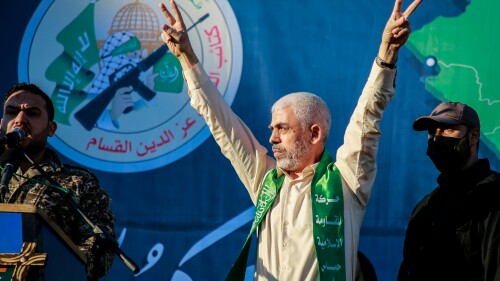Israel is increasingly under fire for the conduct of its military in Gaza. However, the only thing it is doing wrong is being less lethal than it should be.
President Biden issued a directive to cut off military aid to countries violating international civilian protection. While it does not specify Israel, the implication that Israel’s war in Gaza triggered it is evident.
The president also called Israel’s response to Hamas’s October 7 attack “over the top.”
Sen. Chris Van Hollen (D-Md.) proposed an amendment similar to the Biden directive, and accused Israel of committing a “textbook war crime” in Gaza.
The apparent implication – delivered with self-satisfied condescension – is that Israel is guilty of committing war crimes. This assertion is outrageous. Israel has made a concerted effort to protect civilians in Gaza, often at its own cost.
J Street typically supported Van Hollen’s amendment. Its president, Jeremy Ben-Ami, said, “J Street for years called for greater oversight and accountability over arms and materiel provided by the United States to other countries, including Israel. American assistance – even to our closest allies – must not be provided in the form of a blank check.”
The apparent implication – delivered with self-satisfied condescension – is that Israel is guilty of committing war crimes.
This assertion is outrageous. Israel has made a concerted effort to protect civilians in Gaza, often at its own cost.
Israel provides early warnings to Palestinian Arabs in the forms of texts, phone calls, and roof-knocking (when small munitions are dropped on roofs as a warning to evacuate) and pauses its operations four hours daily. The IDF provides military maps to civilians to alert them where the military will be operating and drops leaflets to warn Gazans to evacuate.
John Spencer, the chair of urban warfare studies at the Modern War Institute at West Point, writes that these practices and their widespread use are unprecedented in warfare.
Spencer opines, “Israel has taken more measures to avoid needless civilian harm than virtually any other nation that’s fought an urban war.”
While American military operations in Syria, Iraq, and Afghanistan, and NATO operations in Serbia, had a civilian-to-combatant ratio of four-to-one, the comparable ratio in Gaza is nearly one-to-one.
In what Gen. David Petraeus and historian Andrew Roberts categorize as the most challenging military environment since at least 1945, and in what Spencer calls a war “simply without precedent” in its complexity, the IDF has waged a war of unprecedented morality.
“Israel has taken more measures to avoid needless civilian harm than virtually any other nation that’s fought an urban war.”
So, the accusations of Israel’s conduct being “over the top” can safely be discarded as absurd.
The IDF does too much in providing this kind of advance warning. It puts the lives of Israeli soldiers at risk and considerably slows down its campaign. While admirable, it goes beyond what is necessary to protect innocent civilians. Moreover, it certainly wins no plaudits from the center-left, let alone the “Free Palestine” crowd.
Israel will never impress the bien pensants of the West, no matter how humanely it acts.
Those rarified circles yawned at Israeli concessions of the 1990s and 2000 in the disputed territories and Lebanon, at the Gaza withdrawal (insisting Gaza was still occupied), and at the multiple times Israel has made efforts at peace. And they yawn now.
To this sort of person, Israel is always, forever, and inherently in the wrong, despite this or that historical detail. The Palestinian Arabs, on the other hand, are always, forever, and inherently, in the right, eternal innocents.
In the face of escalating regional tensions and security challenges, Israel must recalibrate its military strategy to prioritize lethal efficiency over the pursuit of moral superiority. This shift is essential for deterring potential aggressors and ensuring a swift and decisive victory in any conflict.
While moral and ethical considerations have their place, they must not impede the operational capabilities of the IDF. The harsh reality of the geopolitical landscape surrounding Israel necessitates a military doctrine that emphasizes overwhelming force and strategic dominance, ensuring that any threat can be neutralized with precision and decisiveness.
While moral and ethical considerations have their place, they must not impede the operational capabilities of the IDF.
Consequently, Israel should invest in advanced weaponry, intelligence capabilities, and cyber warfare to enhance its offensive and defensive operations. Strengthening the IDF’s lethal capacity is a pragmatic approach in a region where threats are multifaceted and evolving. By focusing on lethality, Israel can maintain a posture of deterrence, safeguarding its borders and citizens.
This does not mean abandoning ethical considerations but rather integrating them in a manner that does not compromise the military’s primary goal: the security and survival of the state. In this context, a more lethal IDF is not just a strategic necessity; it is a safeguard for Israel’s future.
Israel must and does adhere to international law and the law of armed conflict. It should not answer or prove itself to anyone. It is a moral country, and its military is the most moral army in the world.
In its drive to destroy Hamas, it must become the world’s most lethal army as well.








